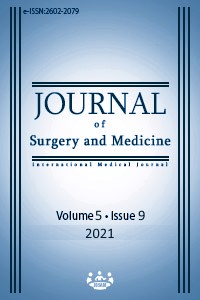Likelihood of cancer in breast cancer imaging according to BI-RADS
Keywords:
Breast, Ultrasonography, Mammography, Magnetic resonance imaging, BI-RADSAbstract
Background/Aim: Breast cancer is the most common type of cancer among women and one of the most common causes of cancer-related death. Breast Imaging-Reporting and Data System (BI-RADS) is widely used in breast imaging and aims to provide effective communication between physicians. This study aimed to investigate the positive predictive values (PPVs) of BI-RADS categories as assessed by different imaging modalities in reference to Tru-Cut biopsy results. Methods: This retrospective cross-sectional observational study included 415 lesions obtained by Tru-Cut biopsy between March 2018 and December 2020. The lesions were examined by ultrasound (US), mammography, and magnetic resonance imaging (MRI) and categorized as BI-RADS 3, 4, or 5. In this system, every category has its own likelihood of cancer ratio. Results: The most common malign and benign lesions were invasive ductal carcinoma and fibroepithelial lesion, respectively. The PPVs of US BI-RADS category 3, 4, and 5 lesions were 2.15%, 47.44%, and 95.19%, respectively, those of mammographic BI-RADS 3, 4, and 5 lesions were 3.79%, 53.45%, and 94.2%, respectively, and those of MRI BI-RADS 3, 4, and 5 lesions were 0%, 57.89%, and 88.1%, respectively. Conclusion: Predicting the probability of cancer in breast imaging is of significance for patient management and effective communication between the radiologist and other physicians. We demonstrated the compatibility of our experience with the literature with this study, in which we demonstrated the possibility of imaging modalities to predict cancer according to BIRADS categories.
Downloads
References
Parkin DM, Bray F, Ferlay J, Pisani P. Global cancer statistics, 2002. CA Cancer J Clin. 2005 Mar-Apr;55(2):74-108. doi: 10.3322/canjclin.55.2.74.
T.C. Sağlık Bakanlığı Türkiye Halk Sağlığı Kurumu, Türkiye Kanser İstatistikleri, Ankara 2017.
Ferlay J, Shin HR, Bray F, Forman D, Mathers C, Parkin DM. Estimates of worldwide burden of cancer in 2008: GLOBOCAN 2008. Int J Cancer. 2010 Dec 15;127(12):2893-917. doi: 10.1002/ijc.25516.
Hortobagyi GN, de la Garza Salazar J, Pritchard K, Amadori D, Haidinger R, Hudis CA, et al. The global breast cancer burden: variations in epidemiology and survival. Clin Breast Cancer. 2005 Dec;6(5):391-401. doi: 10.3816/cbc.2005.n.043.
Kopans DB. The positive predictive value of mammography. AJR Am J Roentgenol. 1992 Mar;158(3):521-6. doi: 10.2214/ajr.158.3.1310825.
Burnside ES, Sickles EA, Bassett LW, Rubin DL, Lee CH, Ikeda DM, et al. The ACR BI-RADS experience: learning from history. J Am Coll Radiol. 2009 Dec;6(12):851-60. doi: 10.1016/j.jacr.2009.07.023.
D’Orsi, C., Bassett, L., & Feig, S. (2018). Breast imaging reporting and data system (BI-RADS). Breast imaging atlas.
Martin HE, Ellis EB. Biopsy By Needle Puncture And Aspiration. Ann Surg. 1930 Aug;92(2):169-81. doi: 10.1097/00000658-193008000-00002.
Spak DA, Plaxco JS, Santiago L, Dryden MJ, Dogan BE. BI-RADS® fifth edition: A summary of changes. Diagn Interv Imaging. 2017 Mar;98(3):179-90. doi: 10.1016/j.diii.2017.01.001 .
Turkish Society of Radiology TRD MRG ve BT inceleme standartları 2018. (https://www.turkrad.org.tr/assets/2018/standartlar2018.pdf. June 19, 2021).
Cameron JL. Current surgical therapy. 9nd edition. Mosby Ine, Philadelphia, PA, USA, 2008.
Wu YC, Chen DR, Kuo SJ. Personal experience of ultrasound-guided 14-gauge core biopsy of breast tumor. Eur J Surg Oncol. 2006 Sep;32(7):715-8. doi: 10.1016/j.ejso.2006.04.012.
İmamoğlu Ç, İmamoğlu Fg, Adibelli Zh, Bayrak A, Aribaş Bk, Erdil Hf. Meme kitlelerinde ultrasonografi eşliğinde koaksiyel tru-cut biyopsi: Klinik tecrübemiz. Acta Oncologica Turcica. 2018;51(2):145-50.
Ağaçlı MO, Kılıçoğlu ZG, Şimşek MM, Meriç K, Kış N, Aker FV, et al. Pathologic Correlation Of Mammographic-Sonographic Bi-Rads Scores. Haydarpasa Numune Med J. 2013;53(1):20-8.
Orel SG, Kay N, Reynolds C, Sullivan DC. BI-RADS categorization as a predictor of malignancy. Radiology. 1999 Jun;211(3):845-50. doi: 10.1148/radiology.211.3.r99jn31845 .
Siegmann KC, Wersebe A, Fischmann A, Fersis N, Vogel U, Claussen CD, et al. [Stereotactic vacuum-assisted breast biopsy--success, histologic accuracy, patient acceptance and optimizing the BI-RADSTM-correlated indication]. Rofo. 2003 Jan;175(1):99-104. doi: 10.1055/s-2003-36600.
Tan YY, Wee SB, Tan MP, Chong BK. Positive predictive value of BI-RADS categorization in an Asian population. Asian J Surg. 2004 Jul;27(3):186-91. doi: 10.1016/S1015-9584(09)60030-0.
Zonderland HM, Pope TL, Nieborg AJ. The positive predictive value of the breast imaging reporting and data system (BI-RADS) as a method of quality assessment in breast imaging in a hospital population. Eur Radiol. 2004 Oct;14(10):1743-50. doi: 10.1007/s00330-004-2373-6.
Mahoney MC, Gatsonis C, Hanna L, DeMartini WB, Lehman C. Positive predictive value of BI-RADS MR imaging. Radiology. 2012 Jul;264(1):51-8. doi: 10.1148/radiol.12110619.
Harms SE, Flamig DP, Hesley KL, Meiches MD, Jensen RA, Evans WP, et al. MR imaging of the breast with rotating delivery of excitation off resonance: clinical experience with pathologic correlation. Radiology. 1993 May;187(2):493-501. doi: 10.1148/radiology.187.2.8475297.
Orel SG, Schnall MD, LiVolsi VA, Troupin RH. Suspicious breast lesions: MR imaging with radiologic-pathologic correlation. Radiology. 1994 Feb;190(2):485-93. doi: 10.1148/radiology.190.2.8284404.
Bluemke DA, Gatsonis CA, Chen MH, DeAngelis GA, DeBruhl N, Harms S, et al. Magnetic resonance imaging of the breast prior to biopsy. JAMA. 2004 Dec 8;292(22):2735-42. doi: 10.1001/jama.292.22.2735.
Kuhl CK, Mielcareck P, Klaschik S, Leutner C, Wardelmann E, Gieseke J, et al. Dynamic breast MR imaging: are signal intensity time course data useful for differential diagnosis of enhancing lesions. Radiology. 1999 Apr;211(1):101-10. doi: 10.1148/radiology.211.1.r99ap38101.
Mercado CL. BI-RADS update. Radiol Clin North Am. 2014 May;52(3):481-7. doi: 10.1016/j.rcl.2014.02.008.
Downloads
- 613 1839
Published
Issue
Section
How to Cite
License
Copyright (c) 2021 Mahmut Çoraplı, Hacı Taner Bulut, Gökhan Çoraplı, Burcin Pehlivanoglu, Hüseyin Alakuş, Hasan Soysaldı
This work is licensed under a Creative Commons Attribution-NonCommercial-NoDerivatives 4.0 International License.
















